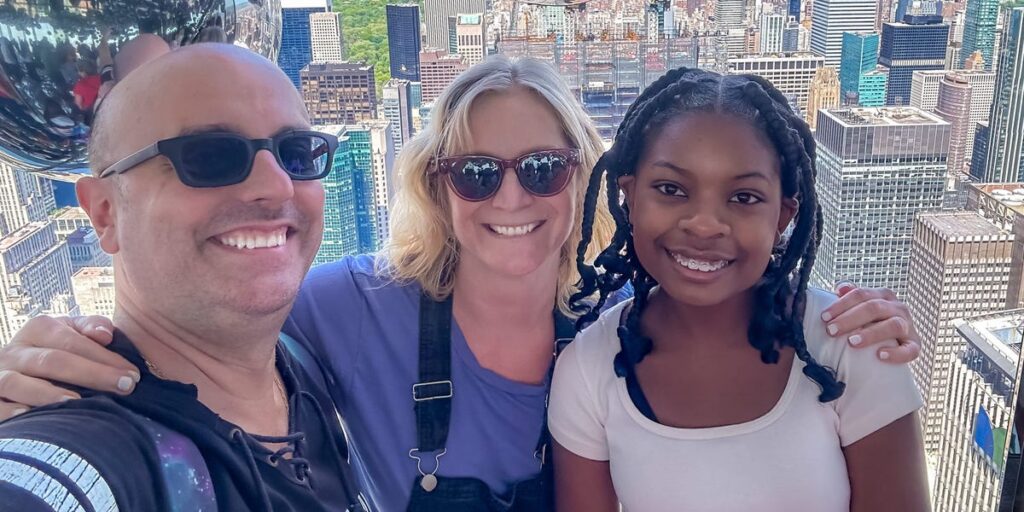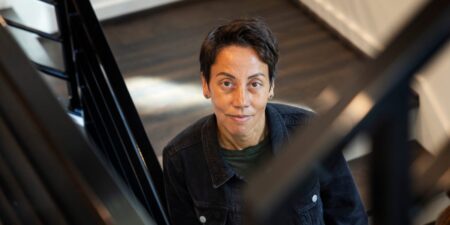- I’ve been lying about my age since my mid-30s.
- When my daughter had to do a family project for school, she caught me in the lie.
- It forced me to confront my feelings about aging, and I’ve stopped lying about it since.
When our daughter was in the second grade, the teacher gave the class an assignment to help everyone get to know their families better. She instructed the kids to create a poster with pictures and artwork, interview their family members, and then present their projects to the class.
My daughter and I sat at the kitchen table, and she took out a sheet of paper featuring a standard list of second-grade questions: name, age, nationality, job, and favorite food. Then, she looked up at me with her sweet little face and asked, “How old are you again?”
I hesitated. Since she didn’t remember my last fictitious answer to that question, I could have taken this opportunity to make things right, and she would have gone on believing I actually practiced what I preached about honesty.
Instead, I smiled and said, “43.” I was 51.
It wasn’t the first time I’d lied about my age
It embarrasses me to admit this. Lying to your own child about your age is a ridiculous thing to do. She’s your kid! She doesn’t care how old you are. Plus, you have an above-average chance of getting caught sooner or later, and then you have to explain yourself.
I knew this from experience. I’d started lying about my age back in my mid-30s, including to the young man — the man 10 years younger than I was —who later became my husband. He caught me too, and I felt like an idiot for lying and knew I should stop. But I didn’t.
The cultural narrative around aging, especially when it came to women, had that much power over me.
Later that evening, my daughter interviewed my husband over dinner and then read out loud what she’d learned about each of us. When she got to my age, he looked at me and shook his head, but he didn’t tell.
It was my mother-in-law who ratted me out the next morning over video chat. From the other room, I heard my daughter start reading her paragraph about me. “My mom’s name is…” I knew I was busted. I rushed into the kitchen just in time to see my perplexed mother-in-law shaking her little, phone-sized head. “No, no, your mom is 51,” she said.
Never a fan of being corrected, my daughter objected at first, but she was no match for her determined grandmother. She looked over at me. “Mom! Are you really that old?”
I nodded.
“So you lied?”
“I’m sorry, sweetie, I shouldn’t have lied to you.” It was almost time to leave for school. “It was a dumb thing to lie about, I’m sorry.”
“Yeah, it was,” she said.
Getting caught forced me to confront my feelings about aging
Over the next few days, I kept thinking about those words. It was a dumb thing to lie about. So why had I done it? Sure, I was roughly 10 years older than most of the other parents in our Brooklyn neighborhood — I’d been 44 when we adopted our daughter — and I worried she might feel weird or embarrassed about having an “old mom.”
But those were my feelings, not hers, feelings I didn’t even believe I should have. How had I allowed myself to succumb so completely to society’s ageist messages when, logically, I knew those messages were wrong?
Aging is a natural biological process that every human being, every living organism, goes through. To feel self-conscious about it makes no sense, and now I had become part of the problem. By lying to my daughter, I was teaching her the same nonsense I’d internalized: that we should feel ashamed of growing old.
Undoing a lifetime of cultural brainwashing takes time and work. I had to make a conscious effort to change how I felt about getting older. I don’t lie anymore, but years after my daughter caught me, I still struggle sometimes with the voice in my head.
When that happens, I remind myself: We can take measures to extend our lives and look younger along the way, but only one thing stops aging. It stops thousands of young people every day. Think about them and remember that growing old is a gift, one immeasurably preferable to the alternative.
Read the full article here
















